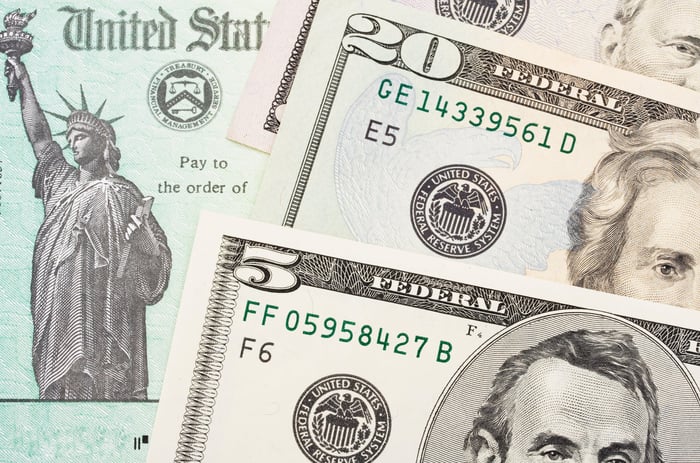Will Social Security Beneficiaries Qualify for a Second Stimulus Check?
Social Security recipients were eligible for an Economic Impact Payment under the CARES Act -- should they expect something similar for stimulus 2.0?
by Sean Williams (TMFUltraLong)In a matter of a couple of months, the coronavirus disease 2019 (COVID-19) pandemic has done the unthinkable. It's brought an unceremonious end to the longest economic expansion in history, as well as displaced close to 39 million workers, according to initial jobless claims over the past nine weeks.
The CARES Act provided relief -- just not enough of it
With no clear-cut end to COVID-19 in sight, and no assurance as to when the U.S. economy will be humming along like old once again, Congress passed and President Trump signed the Coronavirus Aid, Relief, and Economic Security (CARES) Act into law on March 27. At $2.2 trillion, the CARES was the largest relief package ever passed on Capitol Hill, which makes sense given the magnitude of disruption caused by the coronavirus pandemic.

Among the many purposes of the CARES Act, it apportioned $500 billion in loans for distressed industries, set aside almost $350 billion for small business loans, directed $100 billion to hospitals, and allocated $260 billion to expand the unemployment benefits program. This expansion allows approved unemployed beneficiaries to receive an extra $600 per week in benefits through July 31, 2020.
However, what really stands out to most folks about the CARES Act is the $300 billion being dispensed to working Americans and senior citizens. According to the Treasury Department's estimation, more than 150 million Americans will qualify for an Economic Impact Payment (as these payouts are officially known). Thus far, the Internal Revenue Service has sent out around 140 million payments totaling $239 billion.
At their maximum, stimulus checks under the CARES Act can total $1,200 per individual and up to $2,400 for a couple filing jointly. Also, $500 can be added to what a parent or household receives for each qualifying child under the age of 16. To receive this maximum payment, single, married, and head-of-household filers need an adjusted gross income (AGI) below $75,000, $150,000, and $112,500, respectively, in their most recent federal tax return. Hypothetically speaking, this means a married couple with three children and an AGI below $150,000 could net as much as $3,900 under the CARES Act.
Although this money was very much needed by most people, it simply didn't do enough. A 2,200-person Money/Morning Consult poll from April 22 found that 74% of Economic Impact Payment recipients used, or expected to use, their payout in four weeks or less. Thus, it's becoming likelier by the day that a second round of stimulus may be passed on Capitol Hill.

Would a second stimulus check include Social Security beneficiaries?
The big questions, though, are what might this next stimulus package look like, and who would qualify for the payout?
To answer the first question, there are a wide variety of proposals on the table, with many calling for some form of one-time or ongoing compensation to eligible Americans. These proposals range from a few hundred billions dollars in cost to the $3 trillion estimated expense for the Health and Economic Recovery Omnibus Emergency Solution Act, or HEROES Act, which was passed in the House of Representatives on May 15, and has been touted as "dead on arrival" in the Republican-led Senate.
As for the second question, if there's one common theme among the existing proposals that call for another round of payments, it's that they're to remain as (or more) inclusive as the CARES Act. In other words, people who qualified for an Economic Impact Payment are looking very likely to also qualify for a second stimulus check, at least based on the ideas currently floating around Washington, D.C.
This means it's not just workers and their families who are in line to receive stimulus 2.0. Tens of millions of Social Security beneficiaries would also almost certainly qualify for a second one-time or recurring payment. And that's notable considering that the average retired worker only brings home a little over $18,000 annually from Social Security.

For example, the HEROES Act income eligibility requirements are the exact same as under the CARES Act. This means Social Security beneficiaries and couples with respective AGI's of less than $75,000 and $150,000 would qualify for a $1,200 or $2,400 payout. Plus, under the HEROES Act, an extra $1,200 is paid per dependent (up to three dependents) to a parent or household, with all dependents qualifying for this kicker, not just those under the age of 17. Thus, seniors with dependents could actually net even more money under the HEROES Act than the CARES Act.
Likewise, the Emergency Money for the People Act sets eligibility limits at $130,000 per individual and $260,000 for couples filing jointly. Under this plan, eligible individuals and couples would receive $2,000 and $4,000, respectively, for a period of one year. Similar to the CARES Act, the Emergency Money for the People Act would add $500 per dependent to what a parent or household receives, but it would allow dependents of all ages to qualify for the extra $500.
The point is, Social Security beneficiaries have a very good chance of qualifying for a second stimulus check, assuming another round of stimulus is approved in Congress, and this secondary plan takes the form of a monetary disbursement and not something along the lines of rent/mortgage cancellation or refundable payroll tax rebates.